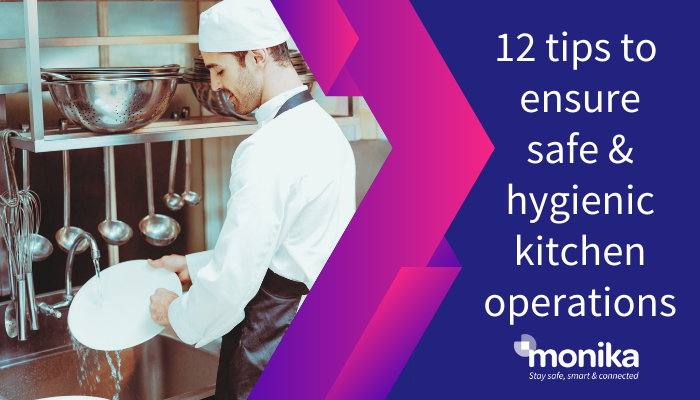
The Food Safety Information Council’s latest report card on Australia’s food safety record estimates there are 4.1 million cases of food poisoning in Australia each year that result in 31,920 hospitalisations, 86 deaths, and 1 million visits to doctors on average each year.
Good hygiene practices in commercial kitchens, as well as home kitchens, are the best way to protect ourselves against the spread of foodborne illnesses.
Hospital kitchens are a melting pot of ideas, food, culture, and high activity aimed at providing an impeccable food experience for patients and visitors alike. A safety-first approach that prioritises good hygiene practices will ensure that these efforts are not wasted. So here are 12 tips to ensure best hygiene practices are always followed in your hospital kitchen.
1. Hand Washing: Thanks to the pandemic our regular hand washing skills have increased dramatically over the past 18 months. Wash your hands before and after food handling, especially raw meats, fish, and eggs, and ALWAYS after a trip to the bathroom. Proper handwashing requires using hot soapy water and scrubbing for at least 20 seconds and can’t be replaced by sanitisers when it comes to hospital kitchens. A digital system like MonikaPrime can help to reinforce these habits by providing audible and visual reminders to wash hands periodically throughout the day.
2. Food Handling: Avoid the use of any rings, watches & bracelets while working in food preparation areas as they can easily become breathing ground for bacteria and be transferred to the food. Avoid using makeup, nail art, and perfumes in the food preparation area as these may contaminate food. Cover your hair with hairnets and appropriate chef hats to ensure there’s no contamination.
3. Food Delivery: When perishable food is delivered to your kitchen it is important to check the temperature of each item to ensure that there are no temperature excursions that could result in bacterial contamination.
4. Food Preparation: Use separate colour-coded chopping boards for fresh vegetables, meat, chicken, and fish preparations. Wash all the fruits and vegetables before cooking. Safe Temperature limits should be maintained when thawing, cooking, cooling, and freezing the prepared food. This temperature data ensures the food is handled properly and safely throughout the cooking process. MonikaPrime customises these processes with the right temperature ranges for each step based on your food safety plan, reducing your risk of food contamination. Read our blog here to learn more.
5. FIFO: First In, First Out is the gold standard in ensuring food is stored and used before its expiry date. Use a digital system like MonikaPrime to schedule regular stock rotation and shelf-life checks, reducing your food wastage and increasing productivity in your kitchen.
6. Right Temperature: Keeping foods at the right temperature during periods of storage can prevent harmful pathogens from growing and multiplying. Make sure that commercial fridges are not overfilled, as there should always be enough room for air to circulate – thereby maintaining the correct temperature. Monitor your cool room temperatures with a centralised digital temperature monitoring system that alerts you when the temperature is out of the preferred range. Both product temperature and the surrounding air temperature must be monitored separately to maintain food safety and prevent stock loss.
7. Worksurfaces: Clean and sanitise all food preparation surfaces and equipment as you go to avoid cross-contamination. Keep separate cleaning cloths for use on surfaces where raw meats, fish, and poultry are handled. Disinfect cleaning clothes regularly throughout the day.
8. Dishwashers: Ensure dishwashers are working at optimal levels at all times. It's important to wash dishes and utensils with 80°C+ temperature to destroy germs and bacteria. The MonikaPrime solution monitors the water temperature in your dishwashers to ensure the system is always working properly, alerting you to any issues in real-time.
9. Equipment Maintenance: Regular maintenance and cleaning of refrigeration equipment should be part of your food safety plan. The MonikaPrime solution can schedule routine cleaning and maintenance checks and provide continuous monitoring to alert you when they are not performing. This will protect your stock while reducing energy consumption and maintenance costs
10. Pest Control: Ensuring your operations area is free of all types of pest infestation is a critical aspect of food safety. Apart from regular pest control treatments, you must have daily deep clean tasks scheduled to ensure there is no buildup of grease and grime in your kitchen. All floor surfaces, cooking equipment, ovens, splashbacks, sinks, drainers, etc should be cleaned and sanitised after every shift. The MonikaPrime solution can help you to monitor these tasks and remind your staff at regular intervals to ensure safety risks are reduced.
11. Food Safety Managers and Supervisors: Every kitchen operations team should appoint a team member as a food safety supervisor who understands food safety regulations and is keen to train fellow team members too. Food safety supervisors can ensure food safety plans and procedures are being always followed and implement corrective actions when necessary. A digital food safety system that provides end-to-end centralised continuous monitoring of your HACCP food safety plan will help managers and supervisors perform their duties and easily identify gaps in staff training and performance.
12. Culture and Training: Good hygiene practices are supported by a strong food safety culture that is maintained through regular staff training, feedback, and support. A digital food safety system will help food safety managers and supervisors reward performance, identify areas for improvement, and schedule both formal training and informal daily ‘toolbox talks’ that reinforce hygiene standards and expectations.
For more information on reducing your food safety risks while gaining visibility and control over your food practices connect with the Monika team today.
Monika has provided digital food safety solutions to the health and aged care sector since the early 1990s. With over 2,000 sites worldwide and 30 years in our field, we are Australia’s leading food safety technology specialists.
For more information contact 1300 857 025,
info@monika.com.au, www.monika.com.au
Posted By
_1.png)